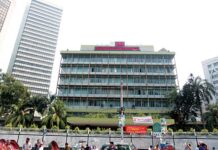Faruque Ahmed
Japan’s Prime Minister Shinzo Abe’s visit to Bangladesh has set the stage of massive investment of his country’s big business houses in Bangladesh at a time Tokyo is set to diversifying investment in some South and Southeast Asian countries to reduce concentration in China.
Senior Japanese officials accompanying the Prime Minister said this sudden upswing to this region is natural and purely driven by economy. But Bangladesh will have to come up with massive infrastructure development while Abe hinted at sorting out political crisis to create the right political environment for investment.
Reports said Abe had told BNP chairperson Begum Khaleda Zia at a meeting with her that he is aware of the fact that major opposition parties had boycotted the last election and it is time both sides must sit together and sort out the crisis.
Meanwhile Prime Minister Sheikh Hasina told the Japanese Prime Minister that she hoped Japan would remain Bangladesh’s trusted and active partner in its journey towards becoming a developed nation by 2041. Begum Zia also urged the Japanese Prime Minister to continue his country’s support and especially support the relocation of Japanese business in Bangladesh.
Can we handle Japan’s challenge?
Political observers in Dhaka believe that Japanese Prime Minister has touched on the political the issue in soft diplomatic language but did not miss it at all. The political stability factor is working at all policy making level, however in a subtle way only to be seen how the parties will sort out it to make Japanese investment here trouble free.
Japanese entrepreneurs want to invest in Bangladesh’s transport, infrastructure, power, energy, garment and such other sectors mainly to boost bilateral trade. Abe told the Japan-Bangladesh Business Forum at a local hotel that Bangladesh is an emerging economy and his government plans to promote Tokyo’s investment in the country. They want to create new business connectivity with some South Asian countries and as Bangladesh is sitting at the centre of BIG-B initiative, Japanese investors are eyeing on the country for relocating manufacturing and other supply chain to connect it with Asia-pacific business network.
But Tokyo’s officials have also made their points clear. They want their own special economic zone at a flood free location closer to the city, positive steps to maintain the investment tempo, its environment, energy supply and infrastructure development. They also want peaceful political climate.
Meanwhile question has arisen on the quality of governance and capacity of investment regulatory bodies as they now exist. Question has also arisen about the effectiveness of the High Powered Committee headed by a senior secretary at the Prime Minister’s Office which is looking into Japanese investment issues at the moment.
News report said former governor of Bangladesh Bank Dr Salehuddin Ahmed has said in fact Japan has thrown a big challenge to Bangladesh by offering massive relocation of investment in the country.
It has opened a new horizon for rapid industrialization. But much of it however depends on the efficient handling of the investors and developing suitable institutions to handle issues to the satisfaction of Japanese investors, he said.
Careful selection needed
An observer pointing at the High Powered Committee said it appears only a short term solution to an urgent issue when organizations like Board of Investment (BOI) or Bangladesh Economic Zone Authority (BERZA) are not having the capacity and also the efficiency and quality of services to handle the matter. He said BEPZA has achieved some capacity so far but a much bigger capacity organization is essential to cope with the huge task of dealing with massive Japanese investment.
But the question is whether the government has the right vision and effective personnel around to build such institutional capacity to handle Japanese investment issues.
A committee can never be expected to handle big trade and investment issues on long term basis without a permanent institutional support. Official sources believe that the merger of BOI and Privatization Commission (PC) may result in developing such a body to fill the vacuum.
But doubts have already overshadowed optimism. Quibbles are already reported cantering the development of the organogram of the new body relating to control of major posts by administrative cadre officials at the cost of non-cadres and technocrats. It shows that there is no change in bureaucratic mindset and as such there is no guarantee that the new organization may prove better either.
There is also a point that most investment regulatory organizations are working under the Prime Minister’s Office. The idea is that anything under the PM office is supposed to work better but in reality they are not controlled by the Prime Minister herself and as such they lacks effective coordination and results. There is hardly any accountability from the top brasses of these organizations; because nobody can dare to demand answers from them.
A source said a new concept is guiding the merger of BOI and PC in creating a new investment regulatory body. In his view, it may be put under a senior minister and other ministers such as those dealing with trade, industry, land, energy, public works, roads, ports and highways may sit on the committee to resolve urgent matters.
He speaks of Japan and Malaysian model where an apex investment regulatory body coordinates the functioning of other investment promotion agencies linked to other sectors of the economy. The apex body functions under a broader Ministry dealing with the economy, industry, trade and investment.
Understanding Japanese mindset
But Bangladesh is neither having such a super ministry dealing with economic issues nor a highly functional apex body coordinating internal and external investment. Moreover, the poor quality of the political leadership is not supportive to developing such institutions. Its bureaucracy lacks dedication, efficiency and honesty to deliver the goods in time and the way it is to be done. Corruption remains the biggest obstacle to development and use of public resources.
Moreover, the government leaders are yet to better understand the mindset of investors, especially the Japanese business. He said the announcement by a senior minister that the government has decided to set up a special economic zone at Mirershorai in Chiitagong for Japanese investors came endorsement of the Japanese side.
In fact JICA is still running a study on site selection and the announcement appeared pre-emptive and partly misleading. He said as far as he knows, Japanese investors may not feel comfortable with that location.
The source also speaks critically on BEZA’s failure to develop a single economic zone or industrial park after five years of its debut and having in hand at least four to five projects.
He said mere creation of an organization is not enough. The government should have engage skilled persons to make the organization quickly functional instead of putting many party men at its control.
The highly authentic source said Japan businessmen hardly believe BEZA will be able to set up a special economic zone that may go into business soon. Most business leader in Bangladesh therefore believe that specialized Japanese business firms which have experience in setting up industrial parks may be given the task to set up industrial park. It may be the best way to cutback longer waiting.
Moreover, Bangladesh business leaders believe that Japanese investors must be provided with land immediately from any source including private land to set up business in Bangladesh. Dr Salehuddin said anything in which the government has a hand ends in delays. Business must not depend on government, he suggested.
Vice President of Japan-Bangladesh Chamber of Commerce and Industry (JBCCI) Salauddin Kasem Khan believes that land may be provided to Japanese investors in the ‘first track’ without waiting for government preparations. They must be confident that something is coming out soon to start mobilization, he said.
Source: Weekly Holiday









